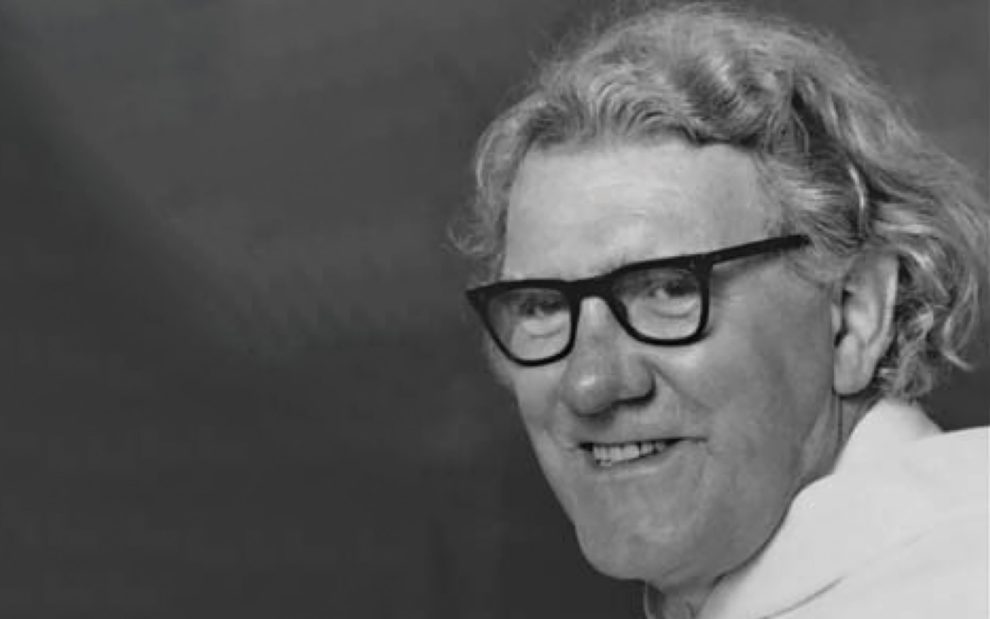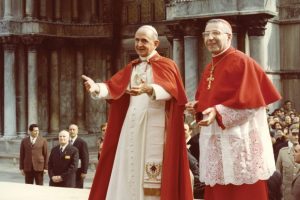I first came across the writings of Dominican Father Herbert McCabe about seven years after his death in 2001. At the time, there existed a seemingly endless debate among U.S. Catholics about evolution and creationism, which I was writing about at the time (and still do).
One of the saner voices among Catholic bloggers, someone who defended the idea of Aquinas being quite compatible with Darwinian evolution, led me to read McCabe’s posthumous 2006 book On Aquinas (Burns & Oates), which was edited by fellow Dominican Brian Davies, his former student and professor of philosophy at Fordham.
Davies also manages McCabe’s estate, and has published a treasure trove of McCabe’s sermons and lectures. McCabe was not an academic theologian, and apart from an early book, most of his written works take the form of sermons and lectures. As such, they have a beautiful simplicity and power—you can almost imagine yourself in the room (or pub) with him as he speaks—even when discussing the most complicated aspects of philosophy and theology.
For me, it was like discovering a cornucopia of spiritual sustenance—something I’d needed deep down without quite realizing it. McCabe approached scripture and tradition with a down-to-earth Irish common sense. Added to that, his scientific background clearly influenced how he examined the questions and challenges raised by the church and theology. He never shrank from them or took refuge in piety.
Born in 1926 in Middlesborough, Yorkshire, England, McCabe had some undergrad training in chemistry at Manchester University before he switched his concentration to philosophy. He joined the Dominicans in 1949 and began to concentrate on the works of St. Thomas Aquinas. This was at a time of various competing “schools” of Thomism that had developed over the centuries since the saint’s death, but McCabe would have none of them. Instead, he brought his own unique perspective to reading Aquinas, which he shared as a preacher and teacher first, rather than as an academic theologian or philosopher (although many of the friends who knew him felt he could have been a leading scholar in academia had he wished).
McCabe presents two major insights in a way I’d never seen before. One is philosophical, the second theological. Both are deeply connected, and while they are not original to him, he expounds on them in a way that made them his own.
The first of his insights is that language (rather than reason) is what truly distinguishes the human species from all others. Language allows humans to communicate with one another in a way that empowers symbols. These symbols enhance and expand human intelligence far beyond that of other species, even the ones that have demonstrated some degree of intelligence (for example, crows, dolphins, and the octopus).
As McCabe writes in his book, The Good Life (Continuum), “With this emergence of language, we begin to have rationality. Rationality is a special way of being in a group. It is because there is some form of linguistic community that there are rational individuals or ‘persons.’ ”
To put it another way, human intelligence is fundamentally relational, born of our social nature and radically enhanced by our ability to communicate via symbolic language.
His second insight is more theological. McCabe championed an idea I think he may have first appreciated in the writings of Thomas Merton: a central theological truth or revelation, implicit in the gospels and the Hebrew Bible, that love, the true love of God, cannot be separated from freedom.
In God Still Matters (Continuum), McCabe writes: “There can be an element of love, in the sense of the recognition of an equal, in all sorts of friendship. It is even possible for parents to love their children. But notice that the evidence for this love is not the things they do for them, their benevolence and kindness.”
The evidence that parents actually love their children, he argues, is in their willingness to let children go to be themselves in a deep sense, to let them be the parents’ equals.
“You will see clearly why love is connected with liberation,” McCabe writes. “Friends give each other presents; they do things for each other. So do lovers. But the essential gift that you can give to one you love is the gift of space to exist, the gift of liberation.”
For me, the miracle in the parable of the prodigal son is not that the son “was lost and then found”—it’s that the young man’s father ever let him go in the first place. It must have broken his heart, and yet he let him go because he loved him in the same way God loves Jesus. And us. The same applies with even greater force to the Passion: God so loved Jesus that God released him; God let him die.
This idea—that divine love is meant to be between equals—is even more radical. Despite being the Creator, God doesn’t want worship from inferiors; rather God wants the love that exists between equals. McCabe believed this notion is reinforced by the very nature of the Trinity. “In this revelation,” McCabe writes, “God is at last able to grow up. Or you can put it by saying our image of God is able to grow up.”
In McCabe’s lecture on original sin (published in God Still Matters), he turns the traditional perspective of the resurrection on its head. We’re used to considering the event in the same terms as the gospel accounts; we think of the faith of Jesus’ disciples and followers regarding the empty tomb and their testimony that they had seen him. When we are asked, “Do you believe?” we respond with a great affirmation of faith. But over the course of a lifetime, the same perspective can become almost banal. Doubts begin to nibble at our belief. Did a dead man really come back to life? Was he transformed by his resurrection into something so supernatural his followers couldn’t recognize him at first?
Jesus was not killed by accident, McCabe writes, nor was he murdered by a chance meeting with individually wicked men. “Jesus posed a political threat not by being a politician but by making people secure, by creating a kind of relationship that couldn’t be accommodated within a society ultimately based on domination and fear.”
In McCabe’s view, Jesus’ death showed the society of his day for what it was. “But more than that, it showed up the human race for what it was. For what was being offered in Jesus was not just a kind of friendship, not just a limited sort of love, but the love that is the meaning of all human existence. To believe Jesus is of God is to believe that, in rejecting him, people are making the most ultimate kind of rejection, the final contradiction of themselves. The crucifixion is not just one more case of a particular society showing its inhumanity. It is the whole human race showing the rejection of itself. The resurrection is the Father’s refusal to accept this self-rejection of man.”
I find myself coming back to this again and again—that the resurrection was the result of a fundamental negation on God’s part, not an affirmation. From God’s perspective, it was not a “wonder” or “miracle” but rather an utter refusal to accept something that happened in the autonomous world of space and time, the very same world God created and loved. Even the Creator could not accept humanity’s rejection—and so God’s response was to hit the “pause” button and then “reset.”
This may sound too analytical and therefore perhaps unspiritual. But I prefer to think that McCabe was considering the matter of the resurrection very much in the style of Aquinas—and in doing so, he was, in his own remarkable way, carrying on a very grand tradition.
This article also appears in the April 2024 issue of U.S. Catholic (Vol. 89, No. 4, pages 45-46). Click here to subscribe to the magazine.
Image: Courtesy of Brian Davies













Add comment